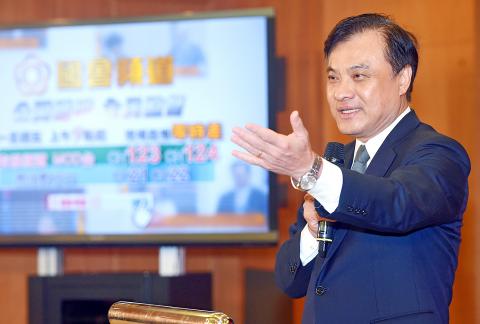The Legislative Yuan yesterday announced the launch of two official parliament television channels, which are to broadcast legislative proceedings live from Friday, the first day of the new legislative session.
The legislative proceedings, including general assembly meetings and committee meetings, had since April last year been broadcast in a pilot project on three commercial television networks commissioned by the legislature.
The official broadcasts are to be aired on public channels 123 and 124 and are governed by the Public Television Service Foundation.

Photo: Liao Chen-huei, Taipei Times
“Twenty-three new media outlets also helped broadcast the legislative meetings in the past year and together they counted more than 10 million viewers, which shows there is a need and public expectation for an open and monitored legislature,” legislative speaker Su Jia-chyuan (蘇嘉全) said.
“Many other democracies, such as the US, the UK, Japan and South Korea, have long had parliament TV. Ours has been planned and set up within a year,” he said, applauding the nation’s swift action.
Su last year pledged a more transparent and open Legislative Yuan, and broadcasting of legislative sessions was one of those promises.
The legislature consented to the pilot project in March last year and in November last year finalized amendments to set up official channels to be operated by the Public Television Service Foundation.
The nation’s major multiple system operators, independent cable system operators and Chunghwa Telecom Co’s media-on-demand TV service agreed to air the legislative sessions on channels 123 and 124, Su said.
The channel numbers were selected to echo World Freedom Day on Jan. 23, as liberty and equality are creeds of the Legislative Yuan, Su added.
Each of the two channels is to broadcast four of the eight legislative committees live on Mondays, Wednesdays and Thursdays, and the general assembly floor meetings on Tuesdays and Fridays are to be simulcast.
Taiwanese sign language translation is to be available for the premier’s policy report at the Legislative Yuan, as it was in the last session, and as of this session, real-time sign language translation is to be broadcast for the question-and-answer session.
Democratic Progressive Party caucus whip Ker Chien-ming (柯建銘) said more transparency and public oversight would reduce the chances of misunderstanding and curb mudslinging among lawmakers.
New Power Party Legislator Hsu Yung-ming (徐永明) said the TV channels would help boost the public’s trust in government agencies.
Chinese Nationalist Party (KMT) Legislator Lin Wei-chou (林為洲) and People First Party Legislator Chen Yi-chieh (陳怡潔) called for interparty cooperation for better policies and image.
“We hope that what people watch on TV will not be our brawls,” Chen said.

Several Chinese Nationalist Party (KMT) officials including Chairman Eric Chu (朱立倫) are to be summoned for questioning and then transferred to prosecutors for holding an illegal assembly in Taipei last night, the Taipei Police said today. Chu and two others hosted an illegal assembly and are to be requested to explain their actions, the Taipei City Police Department's Zhongzheng (中正) First Precinct said, referring to a protest held after Huang Lu Chin-ju (黃呂錦茹), KMT Taipei's chapter director, and several other KMT staffers were questioned for alleged signature forgery in recall petitions against Democratic Progressive Party (DPP) legislators. Taipei prosecutors had filed

Taiwan would welcome the return of Honduras as a diplomatic ally if its next president decides to make such a move, Minister of Foreign Affairs Lin Chia-lung (林佳龍) said yesterday. “Of course, we would welcome Honduras if they want to restore diplomatic ties with Taiwan after their elections,” Lin said at a meeting of the legislature’s Foreign Affairs and National Defense Committee, when asked to comment on statements made by two of the three Honduran presidential candidates during the presidential campaign in the Central American country. Taiwan is paying close attention to the region as a whole in the wake of a

NEW WORLD: Taiwan is pursuing innovative approaches to international relations through economics, trade and values-based diplomacy, the foreign minister said Taiwan would implement a “three-chain strategy” that promotes democratic values in response to US tariffs, Minister of Foreign Affairs Lin Chia-lung (林佳龍) said. Taiwan would aim to create a “global democratic value chain,” seek to capitalize on its position within the first island chain and promote a “non-red supply chain,” Lin was quoted as saying in the ministry’s written report to the Legislative Yuan submitted ahead of the legislature’s Foreign Affairs and National Defense Committee meeting slated for today. The Ministry would also uphold a spirit of mutual beneficial collaboration, maintaining close communication and consultations with Washington to show that Taiwan-US cooperation

Taiwan and the US have begun trade negotiations over tariffs imposed by US President Donald Trump earlier this month, Minister of Foreign Affairs Lin Chia-lung (林佳龍) said in an interview this morning before reporting to the Legislative Yuan’s Foreign Affairs and National Defense Committee. The Taipei Economic and Cultural Representative Office (TECRO), Taiwan’s de facto embassy in the US, has already established communication channels with the US Department of State and the US Trade Representative (USTR), and is engaging in intensive consultations, he said. Points of negotiation include tariffs, non-tariff trade barriers and issues related to investment, procurement and export controls, he